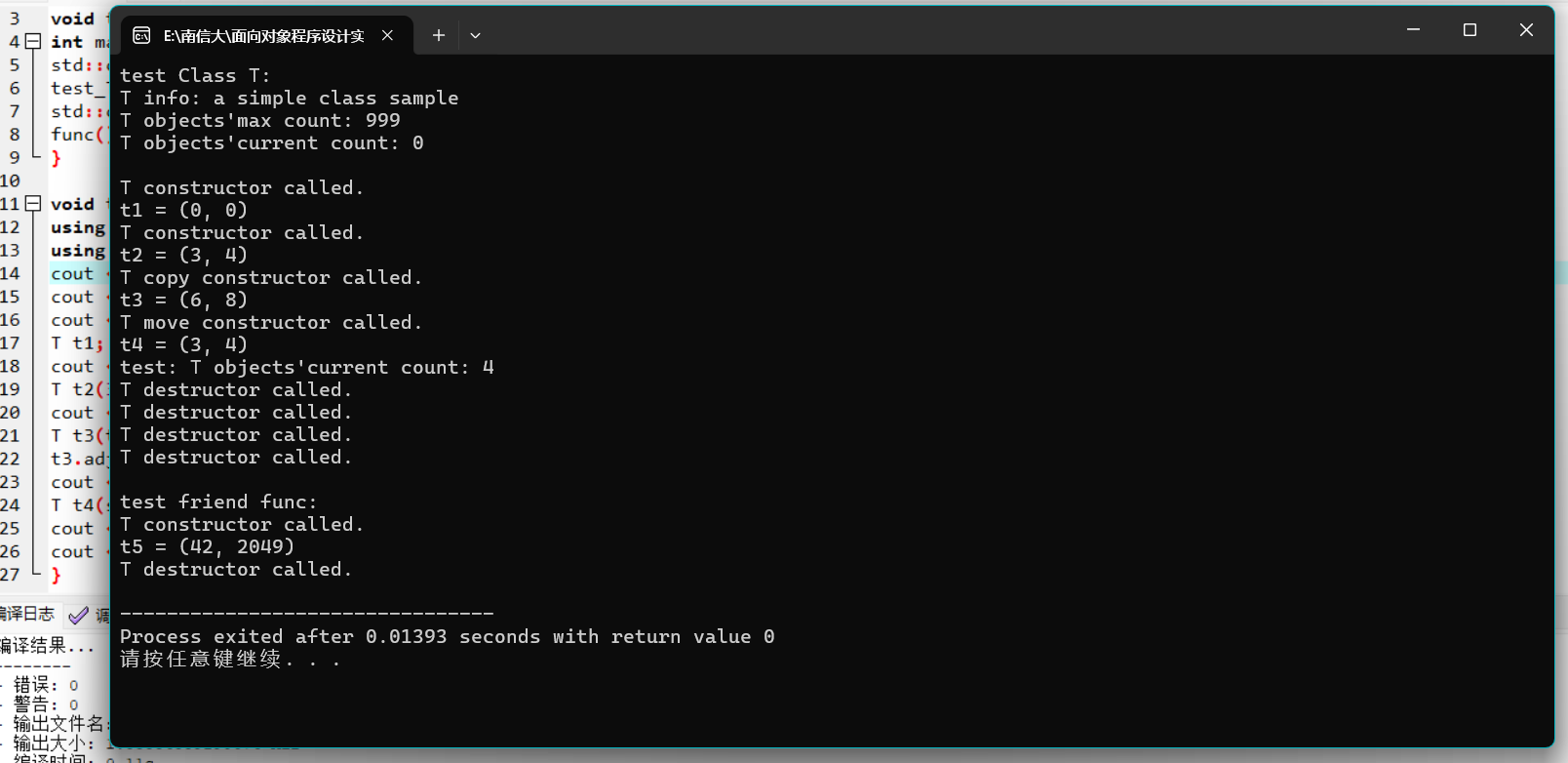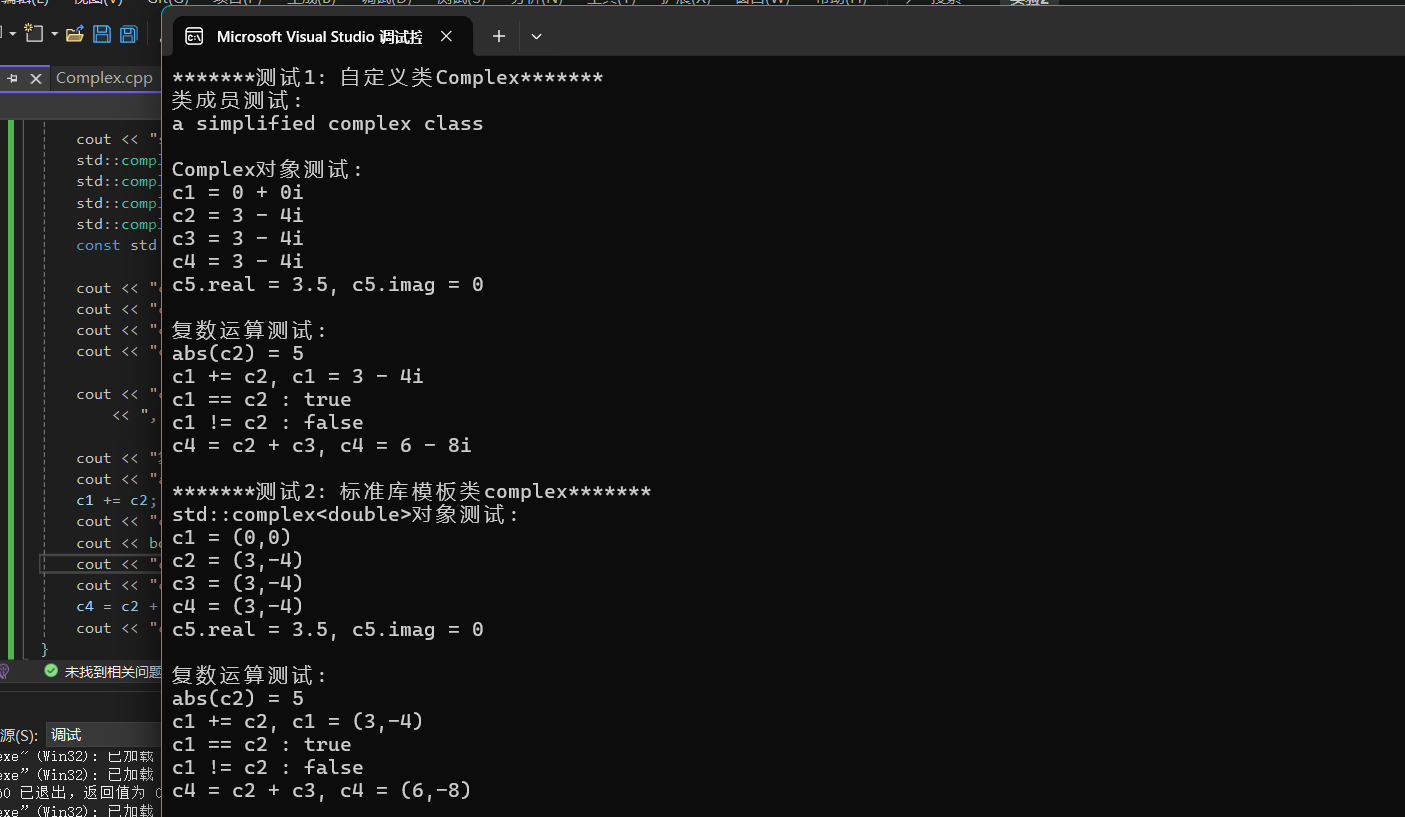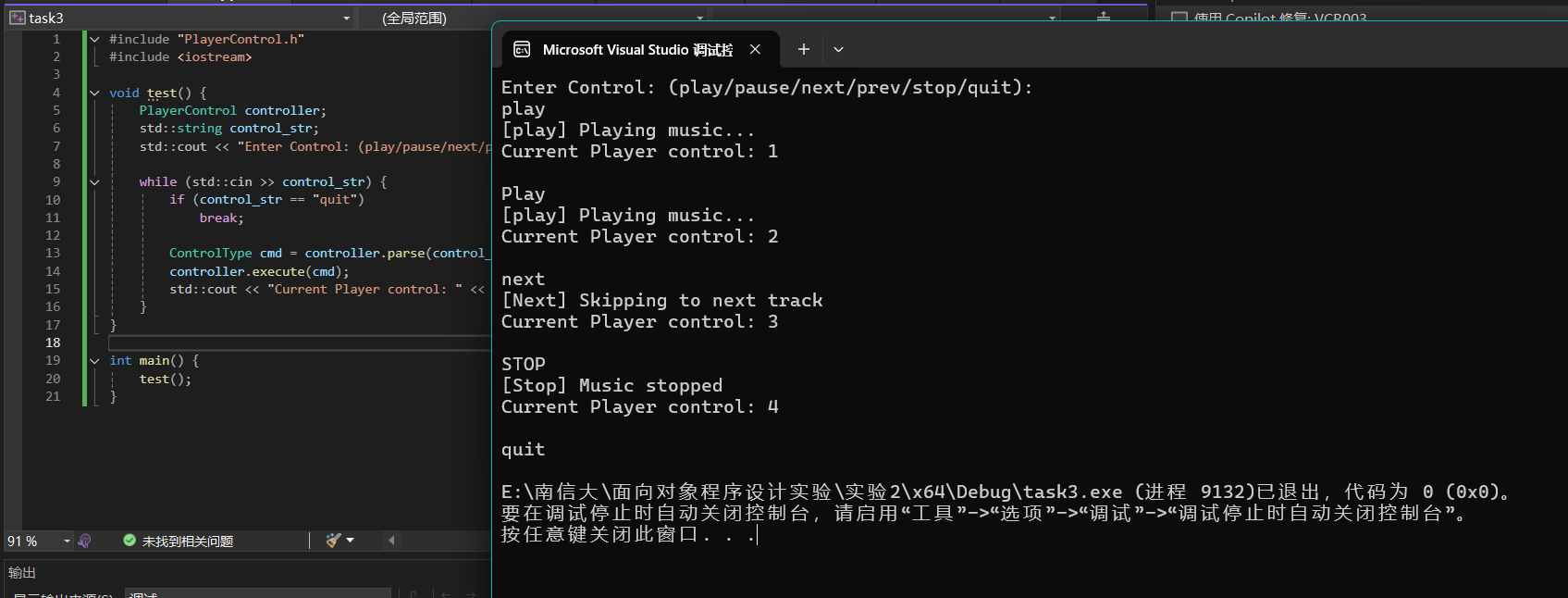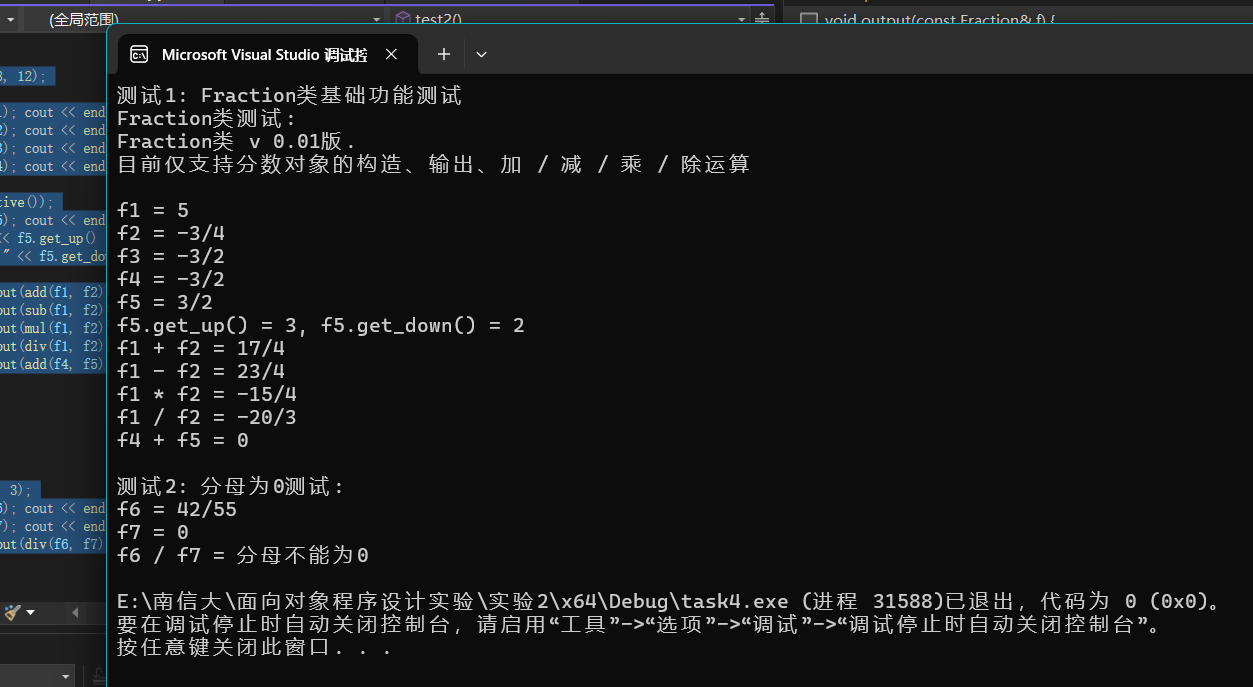实验二
task1
T.h
1 #pragma once 2 3 #include <string> 4 5 // 类T: 声明 6 class T { 7 // 对象属性、方法 8 public: 9 T(int x = 0, int y = 0); // 普通构造函数 10 T(const T &t); // 复制构造函数 11 T(T &&t); // 移动构造函数 12 ~T(); // 析构函数 13 14 void adjust(int ratio); // 按系数成倍调整数据 15 void display() const; // 以(m1, m2)形式显示T类对象信息 16 17 private: 18 int m1, m2; 19 20 // 类属性、方法 21 public: 22 static int get_cnt(); // 显示当前T类对象总数 23 24 public: 25 static const std::string doc; // 类T的描述信息 26 static const int max_cnt; // 类T对象上限 27 28 private: 29 static int cnt; // 当前T类对象数目 30 31 // 类T友元函数声明 32 friend void func(); 33 }; 34 35 // 普通函数声明 36 void func();
T.cpp
1 #include "T.h" 2 #include <iostream> 3 #include <string> 4 5 // 类T实现 6 7 // static成员数据类外初始化 8 const std::string T::doc{"a simple class sample"}; 9 const int T::max_cnt = 999; 10 int T::cnt = 0; 11 12 // 类方法 13 int T::get_cnt() { 14 return cnt; 15 } 16 17 // 对象方法 18 T::T(int x, int y): m1{x}, m2{y} { 19 ++cnt; 20 std::cout << "T constructor called.\n"; 21 } 22 23 T::T(const T &t): m1{t.m1}, m2{t.m2} { 24 ++cnt; 25 std::cout << "T copy constructor called.\n"; 26 } 27 28 T::T(T &&t): m1{t.m1}, m2{t.m2} { 29 ++cnt; 30 std::cout << "T move constructor called.\n"; 31 } 32 33 T::~T() { 34 --cnt; 35 std::cout << "T destructor called.\n"; 36 } 37 38 void T::adjust(int ratio) { 39 m1 *= ratio; 40 m2 *= ratio; 41 } 42 43 void T::display() const { 44 std::cout << "(" << m1 << ", " << m2 << ")" ; 45 } 46 47 // 普通函数实现 48 void func() { 49 T t5(42); 50 t5.m2 = 2049; 51 std::cout << "t5 = "; t5.display(); std::cout << '\n'; 52 }
task1.cpp
1 #include "T.h" 2 #include <iostream> 3 4 void test_T(); 5 6 int main() { 7 std::cout << "test Class T: \n"; 8 test_T(); 9 10 std::cout << "\ntest friend func: \n"; 11 func(); 12 } 13 14 void test_T() { 15 using std::cout; 16 using std::endl; 17 18 cout << "T info: " << T::doc << endl; 19 cout << "T objects'max count: " << T::max_cnt << endl; 20 cout << "T objects'current count: " << T::get_cnt() << endl << endl; 21 22 T t1; 23 cout << "t1 = "; t1.display(); cout << endl; 24 25 T t2(3, 4); 26 cout << "t2 = "; t2.display(); cout << endl; 27 28 T t3(t2); 29 t3.adjust(2); 30 cout << "t3 = "; t3.display(); cout << endl; 31 32 T t4(std::move(t2)); 33 cout << "t4 = "; t4.display(); cout << endl; 34 35 cout << "test: T objects'current count: " << T::get_cnt() << endl; 36 }
运行结果:

问题1:
T.h中,在类T内部,已声明 func 是T的友元函数。在类外部,去掉line36,重新编译,程序能否正常运
行。
如果能,回答YES;如果不能,以截图形式提供编译报错信息,说明原因。
答:

不行,T.h中在类内部声明 friend void func(); 只是声明func是T的友元函数,让func可以访问T的私有成员但这只是友元声明,不是函数声明本身,如果去掉T.h第36行的 void func(); 函数声明,编译器在编译task1.cpp时不知道func函数的存在
问题2:
T.h中,line9-12给出了各种构造函数、析构函数。总结它们各自的功能、调用时机。
答:
第一个是普通构造函数,功能:用指定参数初始化对象,调用时机:创建新对象时,如T m1,T m2(3,4)
第二个是复制构造函数,功能:用已有对象的值初始化新对象,调用时机:对象拷贝时,如 T t3(t2) 或函数传值参数。
第三个是移动构造函数,功能:转移资源,调用时机:使用std::move或临时对象时
第四个是析构函数,功能:销毁对象释放资源,调用时机:对象离开作用域或被delete时
问题3:
T.cpp中,line13-15,剪切到T.h的末尾,重新编译,程序能否正确编译。
如不能,以截图形式给出报错信息,分析原因。
答:

不行,静态函数必须在类外定义,不然会重复定义
task2
Complex.h
1 #pragma once 2 #include <string> 3 4 class Complex { 5 public: 6 7 static const std::string doc; 8 9 Complex(double real = 0.0, double imag = 0.0); 10 Complex(const Complex& other); 11 12 double get_real() const; 13 double get_imag() const; 14 void add(const Complex& other); 15 16 friend void output(const Complex& c); 17 friend double abs(const Complex& c); 18 friend Complex add(const Complex& c1, const Complex& c2); 19 friend bool is_equal(const Complex& c1, const Complex& c2); 20 friend bool is_not_equal(const Complex& c1, const Complex& c2); 21 22 private: 23 double real; 24 double imag; 25 }; 26 27 void output(const Complex& c); 28 double abs(const Complex& c); 29 Complex add(const Complex& c1, const Complex& c2); 30 bool is_equal(const Complex& c1, const Complex& c2); 31 bool is_not_equal(const Complex& c1, const Complex& c2);
Complex.cpp
1 #include "Complex.h" 2 #include <iostream> 3 #include <cmath> 4 5 6 const std::string Complex::doc = "a simplified complex class"; 7 8 Complex::Complex(double r, double i) : real(r), imag(i) {} 9 10 Complex::Complex(const Complex& other) : real(other.real), imag(other.imag) {} 11 12 double Complex::get_real() const { 13 return real; 14 } 15 16 double Complex::get_imag() const { 17 return imag; 18 } 19 20 void Complex::add(const Complex& other) { 21 real += other.real; 22 imag += other.imag; 23 } 24 25 void output(const Complex& c) { 26 std::cout << c.real; 27 if (c.imag >= 0) { 28 std::cout << " + " << c.imag << "i"; 29 } 30 else { 31 std::cout << " - " << -c.imag << "i"; 32 } 33 } 34 35 double abs(const Complex& c) { 36 return std::sqrt(c.real * c.real + c.imag * c.imag); 37 } 38 39 Complex add(const Complex& c1, const Complex& c2) { 40 return Complex(c1.real + c2.real, c1.imag + c2.imag); 41 } 42 43 bool is_equal(const Complex& c1, const Complex& c2) { 44 return c1.real == c2.real && c1.imag == c2.imag; 45 } 46 47 bool is_not_equal(const Complex& c1, const Complex& c2) { 48 return !is_equal(c1, c2); 49 }
task2.cpp
1 // 待补足头文件 2 // xxx 3 #include"Complex.h" 4 #include <iostream> 5 #include <iomanip> 6 #include <complex> 7 8 void test_Complex(); 9 void test_std_complex(); 10 11 int main() { 12 std::cout << "*******测试1: 自定义类Complex*******\n"; 13 test_Complex(); 14 15 std::cout << "\n*******测试2: 标准库模板类complex*******\n"; 16 test_std_complex(); 17 } 18 19 void test_Complex() { 20 using std::cout; 21 using std::endl; 22 using std::boolalpha; 23 24 cout << "类成员测试: " << endl; 25 cout << Complex::doc << endl << endl; 26 27 cout << "Complex对象测试: " << endl; 28 Complex c1; 29 Complex c2(3, -4); 30 Complex c3(c2); 31 Complex c4 = c2; 32 const Complex c5(3.5); 33 34 cout << "c1 = "; output(c1); cout << endl; 35 cout << "c2 = "; output(c2); cout << endl; 36 cout << "c3 = "; output(c3); cout << endl; 37 cout << "c4 = "; output(c4); cout << endl; 38 cout << "c5.real = " << c5.get_real() 39 << ", c5.imag = " << c5.get_imag() << endl << endl; 40 41 cout << "复数运算测试: " << endl; 42 cout << "abs(c2) = " << abs(c2) << endl; 43 c1.add(c2); 44 cout << "c1 += c2, c1 = "; output(c1); cout << endl; 45 cout << boolalpha; 46 cout << "c1 == c2 : " << is_equal(c1, c2) << endl; 47 cout << "c1 != c2 : " << is_not_equal(c1, c2) << endl; 48 c4 = add(c2, c3); 49 cout << "c4 = c2 + c3, c4 = "; output(c4); cout << endl; 50 } 51 52 void test_std_complex() { 53 using std::cout; 54 using std::endl; 55 using std::boolalpha; 56 57 cout << "std::complex<double>对象测试: " << endl; 58 std::complex<double> c1; 59 std::complex<double> c2(3, -4); 60 std::complex<double> c3(c2); 61 std::complex<double> c4 = c2; 62 const std::complex<double> c5(3.5); 63 64 cout << "c1 = " << c1 << endl; 65 cout << "c2 = " << c2 << endl; 66 cout << "c3 = " << c3 << endl; 67 cout << "c4 = " << c4 << endl; 68 69 cout << "c5.real = " << c5.real() 70 << ", c5.imag = " << c5.imag() << endl << endl; 71 72 cout << "复数运算测试: " << endl; 73 cout << "abs(c2) = " << abs(c2) << endl; 74 c1 += c2; 75 cout << "c1 += c2, c1 = " << c1 << endl; 76 cout << boolalpha; 77 cout << "c1 == c2 : " << (c1 == c2) << endl; 78 cout << "c1 != c2 : " << (c1 != c2) << endl; 79 c4 = c2 + c3; 80 cout << "c4 = c2 + c3, c4 = " << c4 << endl; 81 }
运行结果:

问题1:
比较自定义类 Complex 和标准库模板类 complex 的用法,在使用形式上,哪一种更简洁?函数和运算内在有关
联吗?
答:
标准库更简洁,有关联
问题2:
2-1:自定义 Complex 中, output/abs/add/ 等均设为友元,它们真的需要访问 私有数据 吗?(回答“是/否”并
给出理由)
2-2:标准库 std::complex 是否把 abs 设为友元?(查阅 cppreference后回答)
2-3:什么时候才考虑使用 friend?总结你的思考。
答:
2-1:否,因为可以通过公有接口来访问
2-2:否
2-3:需要频繁访问私有成员的函数
问题3:
如果构造对象时禁用=形式,即遇到 Complex c4 = c2; 编译报错,类Complex的设计应如何调整?
答:
Complex (const Complex &c)=delete;
额外设置一个函数重新实现
task3
PlayerControl.h
1 #pragma once 2 #include <string> 3 4 enum class ControlType { Play, Pause, Next, Prev, Stop, Unknown }; 5 6 class PlayerControl { 7 public: 8 PlayerControl(); 9 10 ControlType parse(const std::string& control_str); // 实现std::string --> ControlType转换 11 void execute(ControlType cmd) const; // 执行控制操作(以打印输出模拟) 12 13 static int get_cnt(); 14 15 private: 16 static int total_cnt; 17 };
PlayerControl.cpp
1 #include "PlayerControl.h" 2 #include <iostream> 3 #include <algorithm> 4 5 int PlayerControl::total_cnt = 0; 6 7 PlayerControl::PlayerControl() {} 8 9 // 待补足 10 // 1. 将输入字符串转为小写,实现大小写不敏感 11 // 2. 匹配"play"/"pause"/"next"/"prev"/"stop"并返回对应枚举 12 // 3. 未匹配的字符串返回ControlType::Unknown 13 // 4. 每次成功调用parse时递增total_cnt 14 ControlType PlayerControl::parse(const std::string& control_str) { 15 std::string result = control_str; 16 std::transform(result.begin(), result.end(), result.begin(), 17 [](unsigned char c) { return std::tolower(c); }); 18 if (result == "play") { 19 ++total_cnt; 20 return ControlType::Play; 21 } 22 else if (result == "pause") { 23 ++total_cnt; 24 return ControlType::Pause; 25 } 26 else if (result == "next") { 27 ++total_cnt; 28 return ControlType::Next; 29 } 30 else if (result == "prev") { 31 ++total_cnt; 32 return ControlType::Prev; 33 } 34 else if (result == "stop") { 35 ++total_cnt; 36 return ControlType::Stop; 37 } 38 else { 39 return ControlType::Unknown; 40 } 41 } 42 43 void PlayerControl::execute(ControlType cmd) const { 44 switch (cmd) { 45 case ControlType::Play: std::cout << "[play] Playing music...\n"; break; 46 case ControlType::Pause: std::cout << "[Pause] Music paused\n"; break; 47 case ControlType::Next: std::cout << "[Next] Skipping to next track\n"; break; 48 case ControlType::Prev: std::cout << "[Prev] Back to previous track\n"; break; 49 case ControlType::Stop: std::cout << "[Stop] Music stopped\n"; break; 50 default: std::cout << "[Error] unknown control\n"; break; 51 } 52 } 53 54 int PlayerControl::get_cnt() { 55 return total_cnt; 56 }
task3.cpp
1 #include "PlayerControl.h" 2 #include <iostream> 3 4 void test() { 5 PlayerControl controller; 6 std::string control_str; 7 std::cout << "Enter Control: (play/pause/next/prev/stop/quit):\n"; 8 9 while (std::cin >> control_str) { 10 if (control_str == "quit") 11 break; 12 13 ControlType cmd = controller.parse(control_str); 14 controller.execute(cmd); 15 std::cout << "Current Player control: " << PlayerControl::get_cnt() << "\n\n"; 16 } 17 } 18 19 int main() { 20 test(); 21 }
运行结果:

task4
Fraction.h
1 #pragma once 2 #include<iostream> 3 #include<string> 4 class Fraction { 5 public: 6 static const std::string doc; 7 Fraction(int up, int down = 1); 8 Fraction(const Fraction& f); 9 int get_up() const; 10 int get_down() const; 11 Fraction negative(); 12 friend void output(const Fraction &f); 13 friend Fraction add(const Fraction& f1, const Fraction& f2); 14 friend Fraction sub(const Fraction& f1, const Fraction& f2); 15 friend Fraction mul(const Fraction& f1, const Fraction& f2); 16 friend Fraction div(const Fraction& f1, const Fraction& f2); 17 private: 18 int up; 19 int down; 20 21 }; 22 void output(const Fraction &f); 23 Fraction add(const Fraction& f1, const Fraction& f2); 24 Fraction sub(const Fraction& f1, const Fraction& f2); 25 Fraction mul(const Fraction& f1, const Fraction& f2); 26 Fraction div(const Fraction& f1, const Fraction& f2);
Fraction.cpp
1 #include"Fraction.h" 2 #include<iostream> 3 4 static int gcd_int(int a, int b); 5 6 const std::string Fraction::doc="Fraction类 v 0.01版. \n目前仅支持分数对象的构造、输出、加 / 减 / 乘 / 除运算"; 7 8 Fraction::Fraction(int up, int down):up(up),down(down) {} 9 10 Fraction::Fraction(const Fraction& f) { 11 up = f.up; 12 down = f.down; 13 } 14 15 int Fraction::get_up() const { 16 int u = up; 17 int d = down; 18 if (d == 0) return u; 19 if (u == 0) return 0; 20 if (d < 0) { u = -u; d = -d; } 21 int g = gcd_int(u, d); 22 return u / g; 23 } 24 25 int Fraction::get_down() const { 26 int u = up; 27 int d = down; 28 if (d == 0) return 0; 29 if (u == 0) return 1; 30 if (d < 0) { u = -u; d = -d; } 31 int g = gcd_int(u, d); 32 return d / g; 33 } 34 35 Fraction Fraction::negative() { 36 Fraction f(0); 37 if (this->up >0&& this->down < 0) { 38 f.up = this->up; 39 f.down = -this->down; 40 } 41 else if (this->up < 0 && this->down>0) { 42 f.up = -this->up; 43 f.down = this->down; 44 } 45 else { 46 f.up = this->up; 47 f.down = this->down; 48 } 49 return f; 50 } 51 52 Fraction add(const Fraction& f1, const Fraction& f2) { 53 // a/b + c/d = (a*d + c*b) / (b*d) 54 int up = f1.up * f2.down + f2.up * f1.down; 55 int down = f1.down * f2.down; 56 57 if (down == 0) { 58 // 分母为0的情况直接返回不作约分(由调用方/输出处理) 59 return Fraction(up, down); 60 } 61 62 int g = gcd_int(up, down); 63 up /= g; 64 down /= g; 65 66 // 规范符号:分母为正 67 if (down < 0) { 68 up = -up; 69 down = -down; 70 } 71 72 return Fraction(up, down); 73 } 74 75 Fraction sub(const Fraction& f1, const Fraction& f2) { 76 // a/b - c/d = (a*d - c*b) / (b*d) 77 int up = f1.up * f2.down - f2.up * f1.down; 78 int down = f1.down * f2.down; 79 80 if (down == 0) { 81 return Fraction(up, down); 82 } 83 84 int g = gcd_int(up, down); 85 up /= g; 86 down /= g; 87 88 if (down < 0) { 89 up = -up; 90 down = -down; 91 } 92 93 return Fraction(up, down); 94 } 95 96 Fraction mul(const Fraction& f1, const Fraction& f2) { 97 Fraction f3(f1); 98 f3.up *= f2.up; 99 f3.down *= f2.down; 100 return f3; 101 } 102 103 Fraction div(const Fraction& f1, const Fraction& f2) { 104 Fraction f3(f1); 105 f3.up *= f2.down; 106 f3.down *= f2.up; 107 return f3; 108 } 109 static int gcd_int(int a, int b) { 110 a = a < 0 ? -a : a; 111 b = b < 0 ? -b : b; 112 if (a == 0) return b; 113 if (b == 0) return a; 114 while (b) { 115 int t = a % b; 116 a = b; 117 b = t; 118 } 119 return a; 120 } 121 122 void output(const Fraction& f) { 123 int up = f.up; 124 int down = f.down; 125 126 if (down == 0) { 127 std::cout << "分母不能为0"; 128 return; 129 } 130 131 if (up == 0) { 132 std::cout << 0; 133 return; 134 } 135 136 int g = gcd_int(up, down); 137 up /= g; 138 down /= g; 139 140 if (down < 0) { 141 up = -up; 142 down = -down; 143 } 144 145 if (down == 1) { 146 std::cout << up; 147 } 148 else { 149 std::cout << up << "/" << down; 150 } 151 }
task4.cpp
1 #include "Fraction.h" 2 #include <iostream> 3 4 void test1(); 5 void test2(); 6 7 int main() { 8 std::cout << "测试1: Fraction类基础功能测试\n"; 9 test1(); 10 11 std::cout << "\n测试2: 分母为0测试: \n"; 12 test2(); 13 } 14 15 void test1() { 16 using std::cout; 17 using std::endl; 18 19 cout << "Fraction类测试: " << endl; 20 cout << Fraction::doc << endl << endl; 21 22 Fraction f1(5); 23 Fraction f2(3, -4), f3(-18, 12); 24 Fraction f4(f3); 25 cout << "f1 = "; output(f1); cout << endl; 26 cout << "f2 = "; output(f2); cout << endl; 27 cout << "f3 = "; output(f3); cout << endl; 28 cout << "f4 = "; output(f4); cout << endl; 29 30 const Fraction f5(f4.negative()); 31 cout << "f5 = "; output(f5); cout << endl; 32 cout << "f5.get_up() = " << f5.get_up() 33 << ", f5.get_down() = " << f5.get_down() << endl; 34 35 cout << "f1 + f2 = "; output(add(f1, f2)); cout << endl; 36 cout << "f1 - f2 = "; output(sub(f1, f2)); cout << endl; 37 cout << "f1 * f2 = "; output(mul(f1, f2)); cout << endl; 38 cout << "f1 / f2 = "; output(div(f1, f2)); cout << endl; 39 cout << "f4 + f5 = "; output(add(f4, f5)); cout << endl; 40 } 41 42 void test2() { 43 using std::cout; 44 using std::endl; 45 46 Fraction f6(42, 55), f7(0, 3); 47 cout << "f6 = "; output(f6); cout << endl; 48 cout << "f7 = "; output(f7); cout << endl; 49 cout << "f6 / f7 = "; output(div(f6, f7)); cout << endl; 50 }
运行结果:

问题回答
分数的输出和计算, output/add/sub/mul/div ,你选择的是哪一种设计方案?(友元/自由函数/命名
空间+自由函数/类+static)
你的决策理由?如友元方案的优缺点、静态成员函数方案的适用场景、命名空间方案的考虑因素等。
答:
我选择的是友元函数,优点:增强灵活性,提高性能。缺点:破坏封装性,降低可维护性。




 浙公网安备 33010602011771号
浙公网安备 33010602011771号